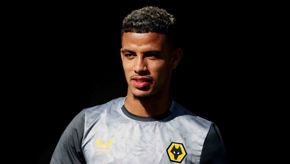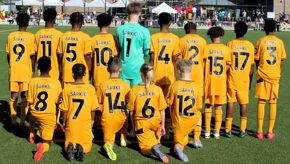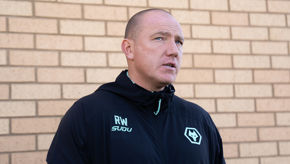As well as being the analyst for Wolves’ under-23 development side, Dan oversees the running of the club’s video and statistical data for all the players in the Academy, with the youth system producing hours of footage on each individual under his watchful eye.
“Every action a player makes on a football pitch will be caught on video and recorded,” Dan said. “I’ll then analyse it appropriately, as we can’t go in and look at absolutely everything a player does.
“But based on their learning plans, we will pull together what we believe is important for them and work with the coaches to figure out what parts of the footage we should look at.
“We work both off video and statistics, so with the under-23s we would look at the opposition, try to find out what system they are likely to play against us, which in turn will help prepare the coaches with training that week.
“They will understand what type of sessions to put on, what areas to focus on, which is going to help best prepare our players for the upcoming game.
“We then do a lot of post-match analysis, so that will look at what will happen within the game, what will happen within training sessions, and that’s going to help our players learn.”
Since the arrival of Nuno Espirito Santo as Wolves’ head coach almost two years ago, the entire philosophy of the club – including the Academy – changed to match how the first-team wanted to play.
“We have a very clear playing philosophy throughout the club, which is now explicitly linked to what the first-team are doing,” Dan explained. “We look at the data, break it down, and pull out the key aspects of what we believe is important and can then pull stats off that.
“This allows us to provide a really clear focus on what we’re actually analysing so it gives some context to the data.
“Everything we do is completely linked with video as well, so if we see somebody has made so many passes or they’ve broken lines more than they usually do, we can go back and look at that and really start to break it down.
“But the amount of time we spend with the players analysing their performances really varies throughout the Academy. With the younger age groups, we like to let them play, encourage them to view themselves and watch their own performances back first and foremost.
“When we get to under-18s and under-23 level, the analysis becomes quite heavily tactical based.”
The video analysis proves a huge tool in the coach’s armoury, as Dan works closely with under-23 head coach Rob Edwards to develop his training sessions based on the footage which is captured by the analysts.
“We need to have knowledge of what the coaches are focusing on in training sessions and what their game plan is on a matchday, along with what each individual players’ learning objectives are and what’s important for their position.
“Rob is very specific in what he does, he is very well prepared and all the analysis we do is integrated into training. We are playing Aston Villa next Monday, so before we finished the last game he will want to know what way Villa are playing so when he puts on training sessions, they are built on that. Other coaches can be more reflective, so we have a good balance.
“Without working closely with coaches, we would not be able to do our job properly. Everything is derived from the coaching process and us looking holistically at that coaching process, before pulling it full circle so we know the player is developing as we would want.
“If players aren’t developing like we would hope, the first thing to do would be to gather as much evidence as we can. If we see something we would communicate with the coaches and if they see it as well, we would know that it’s probably a theme.
“We would then break it down and ask what the key issue is and how can we improve that. Fixing the issues could take something as simple as them watching back their footage, it could be elite player modelling – watching the first-team, for example – or individually working with the coaches, staying behind after training and they do bits and pieces with the player.”
But it’s not just before and after a game where the job of an analysist comes to the fore, as Dan and his team can have an impact during a match.
“Throughout a game, my job is to look at our game plan, keep an eye on the game, and see how it’s playing out,” he added. “We’ll capture all the key things like shots, crosses, transitions, but also look at the specifics, reviewing that as the game goes on and see how that matches up to the plans.
“I’m also ‘mic’d up’ during the game so I can have direct communication to the coaches, so if there’s anything we’re not expecting, or if there’s anything they want to review, then they can speak to me, and then at half-time we normally show some clips.
“I’ll show a couple of bits to the coaches that I’ve seen which will be relevant to the game, as well as to some individuals. It could be something as simple as a goal that a player wants to see so he can look at what happened for it, or any other specifics; I can provide that.
“Normally a player will know if there is something they might not be doing correctly, but if they see it at half-time, they may be able to work out how to put it right themselves. They can also have a chat with one of the coaches if they are not quite sure how to overcome it.
“Most of the time it’s not that a player is doing something wrong, it’s usually the opposition are posing a different problem to what we expected, and if a player doesn’t know how to deal with that, we can show them.”


